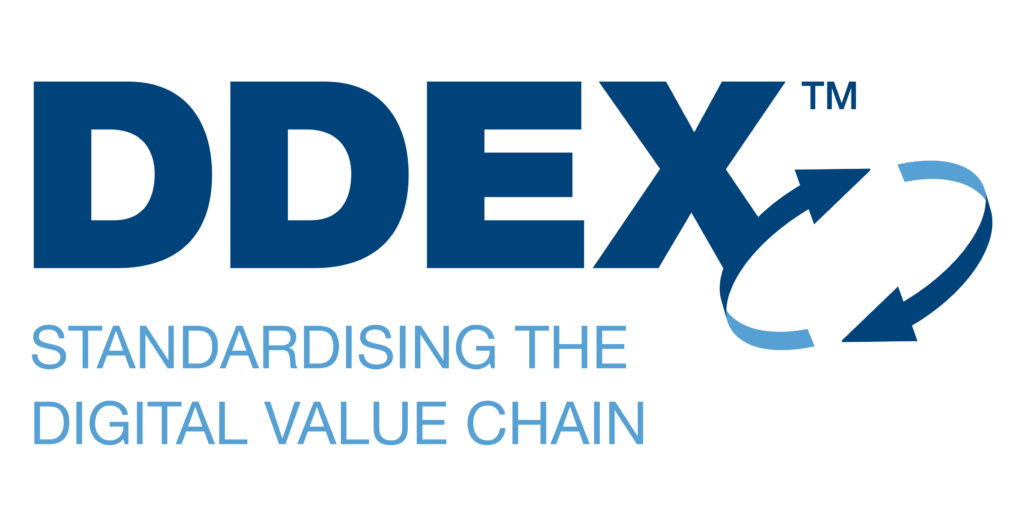DDEX
Press Releases
- DDEX Announces Vistex Has Joined Industry Standards-Setting Organisation As Full Member
- DDEX & A2IM Enter Into Liaison Agreement
- DDEX Publishes ERN 4.3 Update and Catalogue Transfer Standard 1.0
- DDEX, the International Standards Organisation for the Music Industry, Releases “Music in Podcasts,” Outlining the Data and Reporting Flows for this Growing Industry
- DDEX’s THE BIG Summit 2022 Conference and Plenary Meeting to Focus on Rolling Out MEAD Data Implementation; Early Test of MEAD at Amazon Music and Universal Music Group Leads to an Increase in Active and Passive Streaming Behavior
- DDEX & ISNI Announce Signing of Liaison Agreement
- DDEX to Hold Open Meeting 28 September on Music Metadata in Podcasts; Invites All Podcast Creators, Producers, and Distributors to Participate
- Universal Music Group’s Kim Beauchamp Named Chair of the Board of DDEX
- Facebook Joins DDEX As Charter Member
- DDEX Wraps 36th Plenary Meeting and 2nd Creator Credit Summit
- Jimmy Jam to to Keynote DDEX’s Creator Credit Summit on 17 November
- Downtown Music Holdings Joins DDEX As Charter Member of DDEX
- DDEX Finalizes New Claims Standard, Adds New Working Groups at November Meeting
- DDEX Expands Creative Capabilities for Music Metadata with New MEAD Standard
- DDEX Releases New Claims Detail Message Standard, Final Piece of Digital Music Supply Chain between Distributors and Rightsholders
Press Coverage
- Vistex joins DDEX as a full member – Creative Industries News
- DDEX signs liaison agreement with A2IM to help advance DDEX standard adoption
- DDEX releases the new version of the Electronic Release Notification standard
- DDEX Publishes ERN 4.3 Update & Catalogue Transfer Standard 1.0
- DDEX analyses in white paper the data flows related to the use of music in podcasts – Creative Industries News
- Music Biz Member DDEX Releases Findings of Year-Long Music & Podcast Study – Music Biz Member Update
- DDEX has published a white paper about how to use music in podcasts – Podnews.net
- Standards-Setter DDEX Releases Findings Of Year-Long Review Of Music And Podcasts – Inside Radio
- DDEX, the International Standards Organisation for the Music Industry, Releases “Music in Podcasts,” Outlining the Data and Reporting Flows for this Growing Industry – Record of the Day
- DDEX shares data about the impact of the MEAD standard on streaming consumption – Creative Industries News
- Let’s DEW Lunch Rightstech Roundtable with Mark Isherwood – Digital Media Wire
- DDEX signs with ISNI-IA a liaison agreement to promote the use of ISNIs by its members – Creative Industries News
- Music Metadata Organization DDEX Is Looking At Podcasts And It Wants Industry Input – Inside Radio
- RAIN Notes: Friday, September 24 – RAIN News
- DDEX Sets Open Meeting To Discuss Music Metadata Deployment In Podcasts – All Access
- DDEX names Universal Music Group’s Kim Beauchamp as its new Chair of the Board – Legrand Network
- “The Great Data Debate – how do we overcome the industry’s data challenges?” – Niels Rump, Synchtank panel video
- Online Event Alert: DDEX 2nd Annual Creator Credit Summit, Nov. 17-19 – SonicScoop
- Executive Turntable/Jeff King – Billboard
- Music metadata expands with DDEX’s new MEAD standard – Musically
- A New Standard That Makes Music Easier To Find – Forbes
Tech Focus: Sports Music, Part 3 — DDEX Teams With EIDR To Streamline Metadata Standards – SVG News - Groundbreaking Metadata Alliance Announced Between Music, Film, TV Industries — “This Partnership Will Have a Truly Significant Impact on Rights Holders” – Digital Music News
- EIDR Joins Forces with DDEX to Streamline Metadata Standards – M&E Connections
About DDEX
Formed in 2006, DDEX is an international standards-setting organization made up of leading media companies, music licensing organizations, digital service providers, and technical intermediaries that is dedicated to improving the exchange of data and information across the music industry. To support the automated exchange of information along the digital value chain, DDEX has standardized the format in which information is represented in messages and the method by which the messages are exchanged between business partners. These standards help rights holders, retailers, and technical intermediaries to more effectively communicate information along the digital supply chain. This leads to efficient business transactions, reduced costs, and increased revenues for all sectors involved. DDEX standards are developed and made available for industry-wide implementation. For more information, visit www.ddex.net.
The DDEX Standards
There are eight families of DDEX standards: Release Delivery, Media Enrichment and Description, Sales and Usage Reporting, Claim Detail Message Suite, Works Notification and Licensing, Recording Data and Rights, Collection of Studio Metadata and Linking Works and Recordings. The use of standard message formatting speeds up the exchange of information and increases the accuracy of data, improving efficiency along the digital value chain and streamlining content availability through digital service providers to consumers. All the major digital players — including digital retailers, digital distributors and aggregators, record companies, music licensing companies, music publishers, musical work rights societies, and various technical service providers — use DDEX standards with over 5,000 implementation licenses issued and growing daily. While anyone can implement a standard, only DDEX members can be part of the standard development process – more information on membership online here.
Mark Isherwood – Secretariat – DDEX
Mark Isherwood spent 18 years working for the MCPS-PRS Alliance (now PRS for Music), the UK music rights collecting society and one of the biggest in the world, in senior management positions. He was responsible for the development of strategies and policies for substantial rights negotiations with a range of licensee industries, including all the major UK television and radio broadcasters and the video industry. Mark has undertaken rights acquisition negotiations for a major pan-European broadcaster, led a team of consultants in a project for the Joint Information Systems Committee (JISC) examining the intellectual property rights (IPR) consequences of using Creative Commons licences in the HE and FE sectors and led a multi-party project for the European Commission assessing the value of the public domain in the digital ecosystem. He was the non-voting Chair of the Global Repertoire Database Working Group from 2010. Mark was involved in the early industry discussions on the creation and development of DDEX and has led the secretariat since DDEX’s incorporation in 2006.
Niels Rump – Secretariat – DDEX
Niels Rump has been coordinating the standards-development at DDEX since 2006. As such, he is the main author of most DDEX standards.
Niels has worked on the communication of digital rights metadata for more than two decades, initially focusing on developing commercial Digital Rights Management (DRM) systems for which several German and international patents bear his name.
During his time at Fraunhofer IIS (the “home of MP3”), Niels started working in DRM-related standards bodies including ISO/MPEG, AES, OPIMA, SDMI and others. For his work on MPEG standards he has received “ISO/IEC certificates of appreciation”.
Niels holds a Diploma (approx. master’s degree) in computer science from the University of Erlangen-Nürnberg.
Steffen Lindek – Secretariat – DDEX
Steffen Lindek has been involved in the technical development and maintenance of the DDEX standards since 2006. His main task is managing the ontology from which the XML message schemas and the data dictionary are generated.
Steffen has worked on metadata-related projects for about two decades, mostly with a focus on rights metadata in the media sector. Recently he was involved in two EU-funded projects where he worked on mapping and transforming metadata.
Steffen holds a diploma and a PhD in physics, both awarded by the University of Heidelberg, and spent several years in the microscopy group of a research institute for molecular biology.





